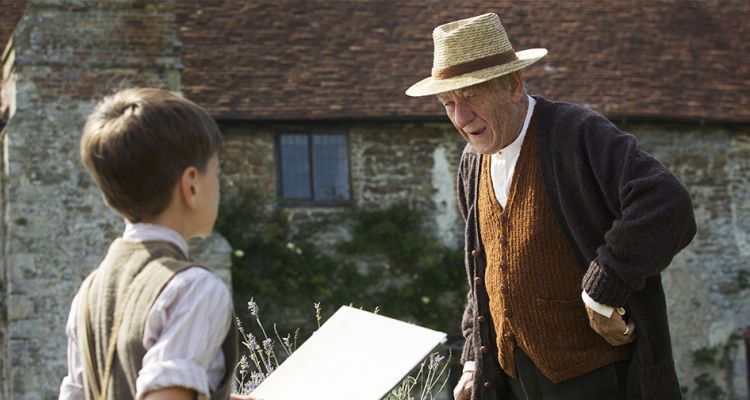 (3.5 / 5)
(3.5 / 5)
Based on Mitch Cullin’s A Slight Trick of the Mind, the title of this adaptation suggests its immediate desire for respectability.
After all Mr. Holmes was part financed by BBC Films and stars no less august a figure than Sir Ian McKellen. Reuniting him with Gods and Monsters director Bill Condon, this film, like their former collaboration, is a study of memory and fading brilliance, though altogether more genteel without the shadow of sexual desire.
As with his portrayal of the urbane but tormented James Whale — real-life director of the original Frankenstein — McKellen turns in a career-equaling performance. Few actors quite provides the same sense of interiority, the inner doubts peeking out between the shutters. As the ninety-three year old Sherlock, doddery and decrepit, McKellen’s default expression here is either lemon-faced or slack-jawed; when he smiles it’s like the sun breaking through the clouds.
Sequestered in a remote farmhouse in Sussex — fields running down to chalk cliffs — his sole passions are beekeeping and trying to ward off senility through infusions of Royal Jelly and Japanese prickly ash. His only visitors are the postman and a concerned doctor (the original Javert, Roger Allam himself, in a tiny role) who warns about the dangers of hope: Holmes’ apiary is under attack by a mysterious pestilence and his memory is rapidly deserting him.
His only company comes in the form of his housekeeper Mrs. Munro (an as-ever remarkable Laura Linney) and her son, Thomas (the quietly fascinating Milo Parker). Thomas is a cruelly perspicacious lad who dreams of more than a life of servitude, but his mother is rightfully concerned about his attachment to her ailing employer. The boy’s interest in him spurs Holmes on in what seems likely to be his last investigation, into his last case some thirty years before.
With his memory having fled, Holmes’ only remaining evidence is a photo of a woman with reproachful eyes (an understatedly yearning Hattie Morahan) and a fictionalized account written by his friend and chronicler Watson. Set in three time periods — Sussex circa 1947, Edwardian Era London, and a recent trip to Japan — Jeffrey Hatcher’s screenplay shifts associatively between them as Holmes struggles to piece together his recollections.
With his memory having fled, Holmes’ only remaining evidence is a photo of a woman with reproachful eyes (an understatedly yearning Hattie Morahan) and a fictionalised account written by his friend and chronicler Watson. Set in three time periods — Sussex circa 1947, Edwardian Era London, and a recent trip to Japan — Jeffrey Hatcher’s screenplay shifts associatively between them as Holmes struggles to piece together his recollections.
Underlying it all is the myth of Holmes himself: there’s the bohemian harmonium teacher (an impeccably hammy Francis de la Tour) who acknowledges only the arch matinee idol of the big screen (played in cameo by Young Sherlock himself, Nicholas Rowe), the mother of Holmes’ Japanese host (a sadly unmemorable Hiroyuki Sanada) who questions his lack of deerstalker. It’s a myth that Holmes himself is well aware of: when bruised he wryly refers to the Hound of the Baskervilles.
The whole film is suffused with loss: Mrs. Munro’s absent husband, the long-dead Watson seen only in soft focus or in part. This Holmes is a man who has spent his life valuing logic over emotion and is now been forced to reassess. Apart from the occasional half-hearted display of his gift, “the thing”, he’s quite unlike any version of the character we’ve seen on film or TV — apart, perhaps, from a certain Mitchell & Webb sketch.
Even so, this take is maybe a touch too agreeable: though slightly sharp, McKellen Holmes’ is far more the kindly old buffer than Benedict Cumberbatch or Robert Downey, Jr.’s incarnation is ever likely to become. In every element of its construction — Tobias A. Schliessler summery cinematography, Carter Burwell’s lilting score — this is classic Sunday afternoon viewing.
Condon’s film is suitably slight, given the original title. More meditative than investigative, Mr. Holmes is hardly essential viewing — despite McKellen’s performance — but is, nevertheless, a more than respectable offering.
